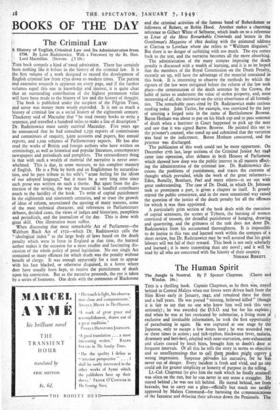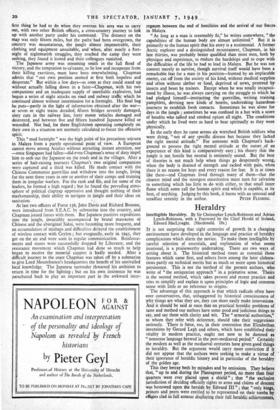The Human Spirit
THIS is a thrilling book. Captain Chapman, as he then was, stayed behind in Central Malaya when our forces were driven back from the Slim River early in January, 1942, and remained there for three and a half years. He was posted " missing, believed killed " (though it is fair to say that no one who knew him well took this very seriously) ; he was awarded the D.S.O. and bar for his exploits ; and when he was at last extricated by submarine, a living mine of exclusive and invaluable information, he took the first opportunity of parachuting in again. He was captured at one stage by the Japanese, only to escape a few hours later ; he was wounded two or three times in action ; and tick-typhus, blackwatem fever, malaria, dysentery and beri -beri, cdupled with near-starvation, over-eXhaustiou and ulcers caused by leech bites, brought him to death's door at frequent intervals. Of all this he tells the story in terms so objective and so unselfconscious that to call than. jnodest might convey wrong impression. Suspense pervades his narrative, for he Was never out of danger. Every incident is fresh and vivid, and no one could ask for greater simplicity or honesty of purpose in the telling. Lt.-Col. Chapman (to give him the rank which he finally attained) was often on the run, but he was never in any sense a straggler. He stayed behind ; he was not left behind. He stayed behind„ not from bravado, but to carry out a plan—officially but much too tardily approved by Malaya Command—for harassing the communications of the TaDanese and delaying their advance down the Peninsula. The
first thing he had to do when they overran his area was to carry out, with two other British officers, a cross-country journey to link up with another party under his command. The distance on the map was only fifteen miles, but the paths had been overgrown, the country was mountainous, the jungle almost impenetrable, their clothing and equipment unsuitable, and when, after nearly a fort- night of nightmarish struggles, they reached the camp they were seeking, they found it looted and their colleagues vanished.
The Japanese army was streaming south in the full flood of victory, and the temptation to ca'canny, to lie low and recuperate from their killing exertions, must have been overwhelming. Chapman admits that " our own position seemed at first both hopeless and desperate." But within a few days—as soon as they could stand up without actually falling down in a faint—Chapman, with his two companions and an inadequate supply of unreliable explosives, had begun- a series of night attacks on road and railway traffic which he continued almost without intermission for a fortnight. His final bag he puts—partly in the light of information obtained after the war- m seven or eight trains derailed, fifteen bridges severely damaged, sixty cuts in the railway line, forty motor vehicles damaged and destroyed, and between five and fifteen hundred Japanese killed or wounded. Not bad, for three Englishmen operating completely on their own in a situation not normally calculated to foster the offensive spirit.
This " mad fortnight " was the high point of his precarious sojourn in Malaya from a purely operational point of view. A European cannot move among Asiatics without attracting instant attention, nor —once Singapore had fallen—did even Chapman's sense of duty impel him to seek out the Japanese on the roads and in the villages. After a series of hair-raising journeys Chapman's two original companions were captured and a third was killed. He made contact with the Chinese Communist guerrillas and withdrew into the jungle, living for the next three years in one or another of their camps and training them in irregular warfare. For the rank and file, and for some of the leaders, he formed a high regard ; but he found the pervading atmo- sphere of political claptrap oppressive and thought nothing of their marksmanship, their ability to navigate in jungle and their ideas on sanitation.
At last two officers of Force 136, John Davis and Richard Broome, were introduced from S.E.A.C. by submarine into the country, and Chapman joined forces with them. But Japanese punitive expeditions into the jungle, invariably accompanied by brutal massacres of Chinese and the aboriginal Sakai, were becoming more frequent, and an accumulation of mishaps and difficulties delayed the establishment of wireless contact with Ceylon ; but evecitually, early in 5945, they got on the air and were soon in regular communication. Reinforce- ments and stores were successfully dropped by Liberator, and the resistance movement which Chapman had done so much to help began to receive the material support it badly needed. After a difficult journey to the coast Chapman was taken off by a submarine to give Lord Mountbatten's headquarters the benefit of his unrivalled local knowledge. The Japanese surrender thwarted his ambition to return in time for the fighting ; but on his own insistence he was parachuted back -to play an important part in the awkward inter-
regnwn between the end of hostilities and the arrival of our forces in Malaya.
" As long as a man is reasonably fit," he writes somewhere, " the capabilities of the human body are almost unlimited." But it is primarily to the human spirit that his story is a testimonial. A former Arctic explorer and a distinguished mountaineer, Chapman, in his late thirties, was probably better qualified than most men, both by physique and experience, to endure the hardships and to cope with the difficulties of the life he had to lead in Malaya. But he was not content merely to survive, though survival itself would have been a remarkable feat for a man in his position—hunted by an implacable enemy, cut off from the society of his kind; without medical supplies and often without shelter or food, deprived of news, pestered by insects and beset by traitors. Except when he was totally incapaci- tated by ihness, he was always carrying on the struggle to which he had pledged himself—instructing the guerrillas, writing training pamphlets, devising new kinds of bombs, undertaking hazardous journeys to establish fresh contacts. Sometimes he was alone for days in the jungle • sometimes he was confined in a but with a score of bandits who talked and smoked opium all night. The conditions under which he lived were as hard to bear spiritually as they were physically.
In the early days he came across six wretched British soldiers who were dying, "not of any specific disease but because they lacked the right mental attitude." For someone with Chapman's back- ground to possess the right mental attitude at the outset ,of an experience of this kind is coMparatively easy ; his theory that the jungle is not hostile but neutral is eminently sound. But the best of theories is not much help when things go desperately wrong, when the body is drained of strength and racked with pain, when there is no reason for hope and every reason for fear. It is at times like these—and Chapman lived through many of them—that the clearest mind and the strongest constitution must turn for salvation to something which has little to do with either, to that small inner flame which some call the human spirit and which is capable, at its best, of anything. Judging by this book, it burns with an unusual and







































 Previous page
Previous page